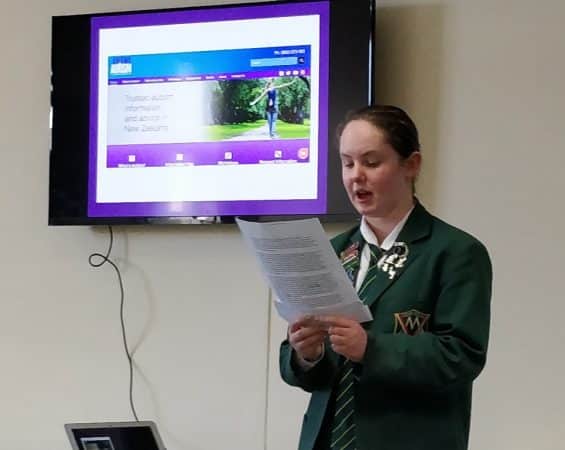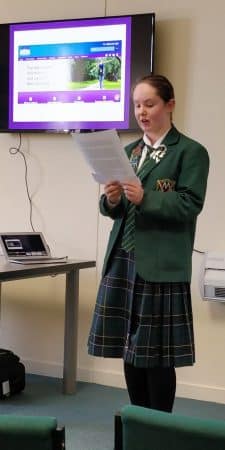
Bethany Hughes
Speaking at a recent network meeting in Invercargill Bethany Hughes, who was diagnosed with Asperger’s Syndrome when she was five, spoke of how learning and growing with autism was by no means an easy experience.
I’ve had my fair share of social and emotional challenges. At the same time, autism has also given me a unique insight for detail, a bold, questioning nature, and a passion for causes I care about.
Learning and growing with autism is by no means an easy experience, and I’ve had my fair share of social and emotional challenges. At the same time, autism has also given me a unique insight for detail, a bold, questioning nature, and a passion for causes I care about. In this speech, I will share the challenges I have faced, how it has shaped my identity, how every person is unique, and, most importantly, the amazing ingenuity, empathy, and unique perspectives that people with autism can show us.
I was a troublesome young child, often refusing to speak, make eye contact, or interact with anyone outside of my immediate family. Dinosaurs, not social games or doll houses were the pinnacle of wonder in my world. Often, I would spend hours alone in my room, finding a simple but special kid of joy in organising dinosaur figures in particular patterns. To say that anything social was just not in my interest– well, that would be a gross understatement. How I despised team games! Four days out of five, I would refuse to participate until the teacher gave in and let me play by myself instead. Does any of this sound familiar to you? Some might look at me back then and think ‘It’s just a funny little phase. She’ll get ‘right’ soon.” However, as I grew older, it became more and more clear to me that my way of thinking was different.
Despite my early diagnosis, it wasn’t until the age of ten. A book titled ‘All Cats have Asperger’s Syndrome’ was handed to me, and I wondered ‘what on Earth is this all about?’ Upon reading this book, it felt as if my brain had undergone a reboot. Everything that has happened made sense. The difficulty with fitting in, an unusually vivid imagination, excessive curiosity, and passionate interest in nature– it all clicked together. I felt a lot of relief in finding out why I thought the way I do after these years, but I also was very frightened about my future following this discovery. I worried that I would never find any true friends I could rely on, or that I wouldn’t be able to achieve my dreams of a career with nature because of my condition.
It is normal to feel scared, confused, or overwhelmed following a diagnosis. Issues with picking up social cues, anxiety, finding friends, sensory sensitivity, and discrimination were and still common for me today. I hate being forced to participate in activities typical of my age group that I find exhausting and pointless. You may have noticed that my direct eye contact is infrequent. I also get very tense over changed schedules, and I like to keep to myself most of the time.

It is not autism itself that causes conflict and social exclusion, however. It is ignorance. There are many dangerous false ideas such as the notion that no one wants to be friends with an autistic child, or that your child has no empathy. These stereotypes do nothing but undermine the inherent worth of people on the spectrum. For example, I have read many stories of others on the spectrum that find it difficult to read others’ body language and facial expressions but feel what another is feeling when a person or animal they care about is suffering. I am one of these people. Another instance is when ‘autistic’ is used as an insult. This is an attempt to make the abusers feel superior – yet, in reality, they are ignoring the incredible abilities that people with autism have, and therefore making idiots of themselves.
Not all discrimination is intended. Some people may notice that little eye contact is being made and assume that the autistic person doesn’t want to talk to them, without realising these actions and statements may be harmful. Not all neglect is deliberate either; often, it can be based on lack of knowledge of why people with autism may not understand some social cues. That’s why open and honest communication between both parties is so important.
While predisposed characteristics, such as sensitivity to certain sensory stimuli, cannot be eliminated completely, they can be managed successfully, as I have experienced myself. When I was younger, I loathed any loud noise. With gradual exposure to noise, I have become more tolerant of it to the point where I can enjoy the occasional concert. Mindfulness strategies have greatly helped me with my anxiety when things don’t go as planned, and I have gained several amazing friends that can relate to my perspective through opening up and talking to them.
I am deeply grateful for my Asperger’s syndrome, for it has given me a powerful imagination, unique insight for detail, honesty that allows me to say what needs to be said, and unparalleled curiosity and passion for what is important to me. When I was four, I required speech therapy. Now I have gained excellence in NCEA Level One and Two, and aspire to study for an ecology degree at university next year. Without autism, I might have never discovered the awe of nature and the immense value of caring for it or experienced the joy of my creativity coming to fruition. Every one of the challenges I have faced with autism has, in the long run, has made me a much stronger, kinder, and wiser person than I was before. I wouldn’t trade my autism for anything.
Thinkers on the spectrum have gifted society ideas of immeasurable value and will continue to do so. Consider Bill Gates, the creator of Microsoft, or Satoshi Tajiri, inventor of the Pokémon franchise. Numerous other artists, scientists, musicians, philosophers, and business innovators throughout the spectrum have had a positive impact on society in some way. Even if it does not seem obvious at first, people with autism have incredible potential that should not be overlooked.
People on the spectrum have a wide range of unique abilities, and although they face different problems from the neurotypical population, they can live with great joy and fulfilment if allowed the opportunities and guidance to do so. If you could only take one takeaway message from this presentation, it would be that society needs to stop looking as autism as a lack of ability. Instead, recognise for the abundance of ability it really is. As the wise Temple Grandin said, ‘We are not less. Just different.’
“A disability is usually defined in terms of what is missing. … But autism … is as much about what is abundant as what is missing, an over-expression of the very traits that make our species unique. ”
— Paul Collins
- Bethany delivered this speech at the Altogether Autism Connecting with Community network meeting in Invercargill on May 10, 2019
- An abridged version of this speech appeared in the Altogether Autism Journal, Issue 1, 2019


